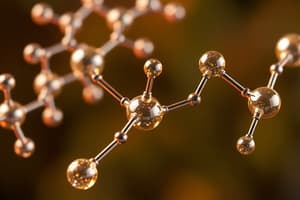Podcast
Questions and Answers
What is the main focus of organic chemistry in terms of bonds?
What is the main focus of organic chemistry in terms of bonds?
- Ionic bonds
- Carbon-carbon and carbon-heteroatom bonds (correct)
- Single covalent bonds
- Carbon-hydrogen bonds
Why is carbon considered the 'lifeblood' of organic chemistry?
Why is carbon considered the 'lifeblood' of organic chemistry?
- It can form weak ionic bonds with other elements
- It is abundant in inorganic compounds
- Its ability to form strong covalent bonds with itself and other elements (correct)
- It has a high reactivity with water
Which type of bond is represented by a single line between bonded atoms in organic molecules?
Which type of bond is represented by a single line between bonded atoms in organic molecules?
- Ionic bond
- Single covalent bond (correct)
- Triple bond
- Double bond
What do carbon-carbon and carbon-heteroatom bonds determine in organic compounds?
What do carbon-carbon and carbon-heteroatom bonds determine in organic compounds?
In organic chemistry, what kind of bonding is denoted by a triple line between two atoms?
In organic chemistry, what kind of bonding is denoted by a triple line between two atoms?
What are functional groups in organic chemistry responsible for?
What are functional groups in organic chemistry responsible for?
Which of the following is NOT a common functional group in organic chemistry?
Which of the following is NOT a common functional group in organic chemistry?
Why is understanding the arrangement of atoms in organic compounds important?
Why is understanding the arrangement of atoms in organic compounds important?
What is synthetic organic chemistry primarily focused on?
What is synthetic organic chemistry primarily focused on?
In which field do biochemistry, pharmaceuticals, and materials science benefit from organic chemistry?
In which field do biochemistry, pharmaceuticals, and materials science benefit from organic chemistry?
Study Notes
Uncovering Organic Chemistry: A Fascinating World of Carbon Bonds
Organic chemistry is the branch of science that studies the structure, properties, and reactions of organic compounds—molecules containing carbon and hydrogen, often with other elements like oxygen, nitrogen, and halogens. This field, brimming with intricate bonds and fascinating reactions, forms the backbone of the world of chemistry we know today.
Carbon: King of Organic Chemistry
Carbon is the lifeblood of organic chemistry. It's unique in its ability to form strong covalent bonds with itself and other elements, allowing it to create an enormous variety of molecules. Carbon's versatility lends itself to the diverse and complex world of organic compounds, from sugars and amino acids to drugs and plastics.
Bonds and Reactions: Heart of Organic Chemistry
In organic chemistry, the carbon-carbon and carbon-heteroatom bonds are the main focus. These bonds form the backbone of organic molecules and determine their properties and behavior in various reactions. The most common bond type is the single covalent bond, represented by a single line between the bonded atoms. Double and triple bonds, denoted by a double and triple line, respectively, show stronger bonding.
Organic compounds undergo a wide variety of reactions that involve breaking, forming, and changing bonds. These reactions are the cornerstone of organic chemistry and are essential to understanding and harnessing organic compounds' properties for technological and pharmaceutical applications.
Functional Groups: Building Blocks of Organic Chemistry
Functional groups are specific atoms or groups of atoms within organic compounds that are responsible for their characteristic chemical behavior and reactivity. Common functional groups include alcohols, ethers, aldehydes, ketones, carboxylic acids, and amines.
Structure and Properties: The Foundation of Organic Chemistry
Understanding how the arrangement of atoms in organic compounds is crucial to predicting their properties. Organic compounds can be classified based on their molecular geometry and bonding, providing valuable insights into their physical and chemical behavior.
Synthesis: Creating New Organic Compounds
Synthetic organic chemistry is the art of creating new organic compounds from simpler starting materials. This field utilizes various methods and techniques to build molecules step by step, often using multistep reactions and protecting group strategies to achieve the desired final product.
Applications of Organic Chemistry
Organic chemistry has a wide range of applications, from everyday products to advanced technologies. Biochemistry, pharmaceuticals, materials science, and environmental science are just a few examples of the diverse fields that benefit from organic chemistry's discoveries and advancements.
Organic chemistry is a fascinating and ever-evolving field of study, offering endless opportunities for discovery and innovation. The complex world of organic compounds, with their diverse properties and applications, continues to captivate and inspire researchers and scientists alike.
Studying That Suits You
Use AI to generate personalized quizzes and flashcards to suit your learning preferences.
Description
Dive into the world of organic chemistry and explore the structure, properties, and reactions of carbon-based compounds. Learn about carbon's unique bonding capabilities, the significance of functional groups, the importance of bonds in determining compound behavior, and the diverse applications of organic chemistry in various fields.




